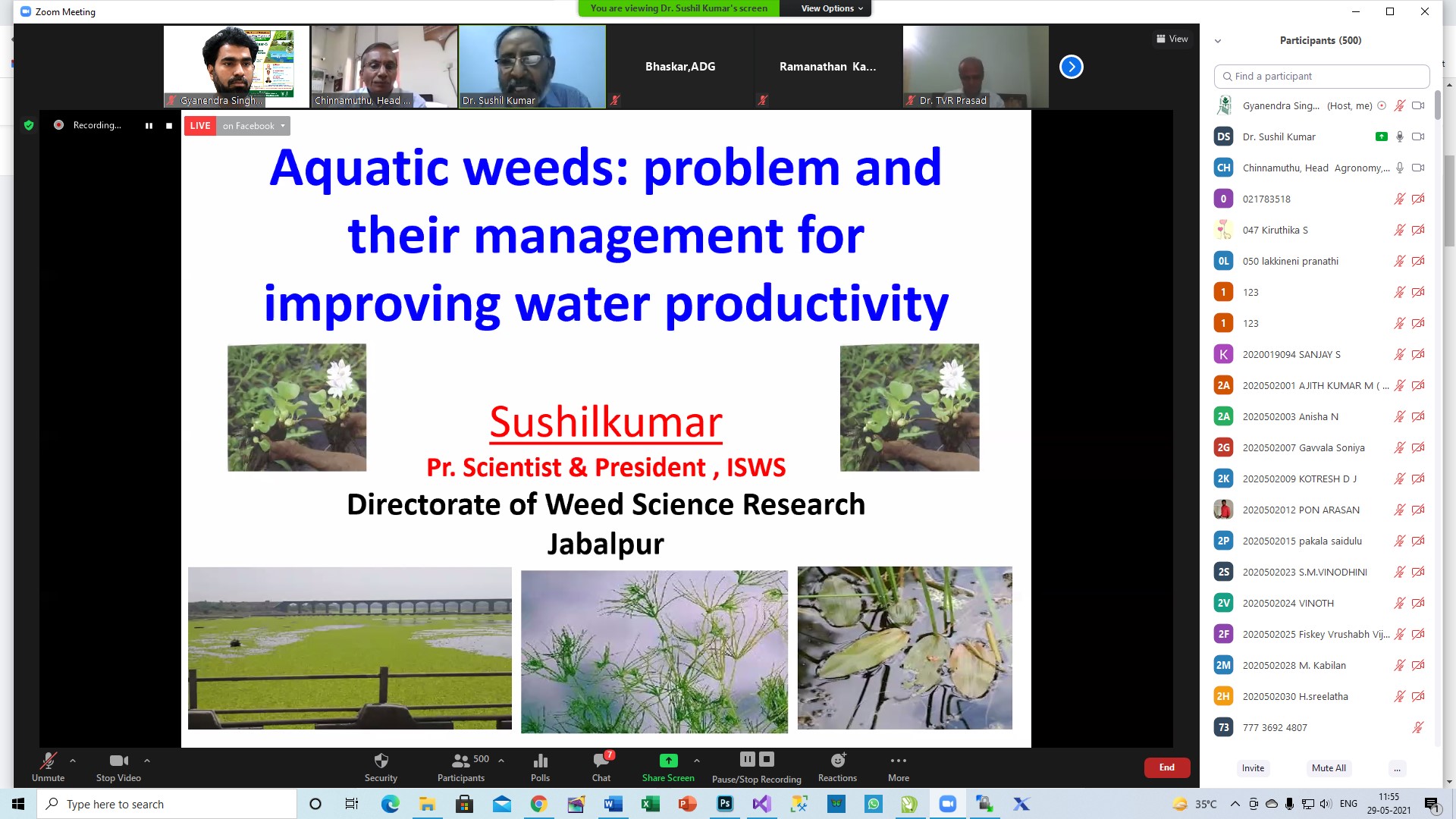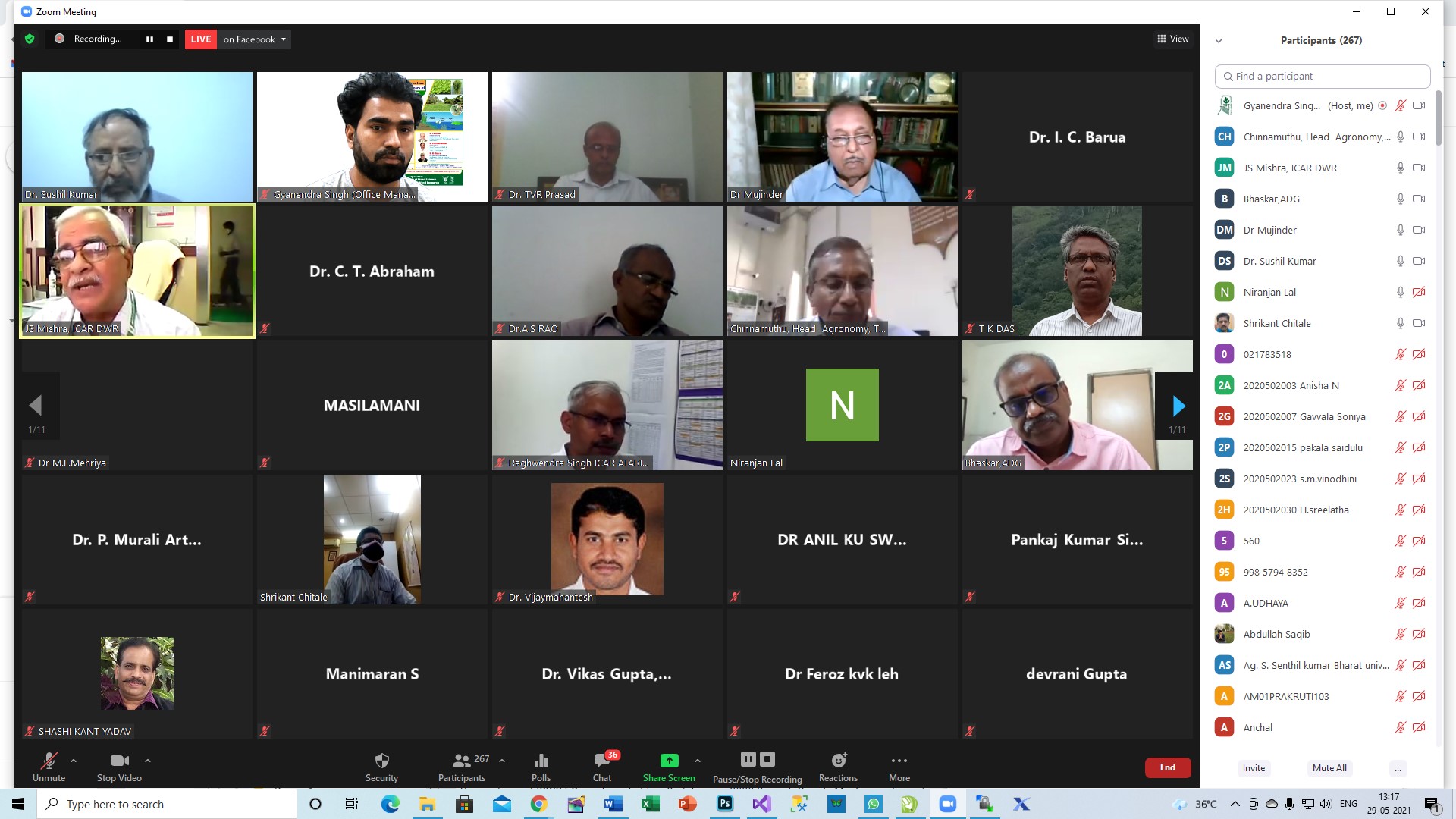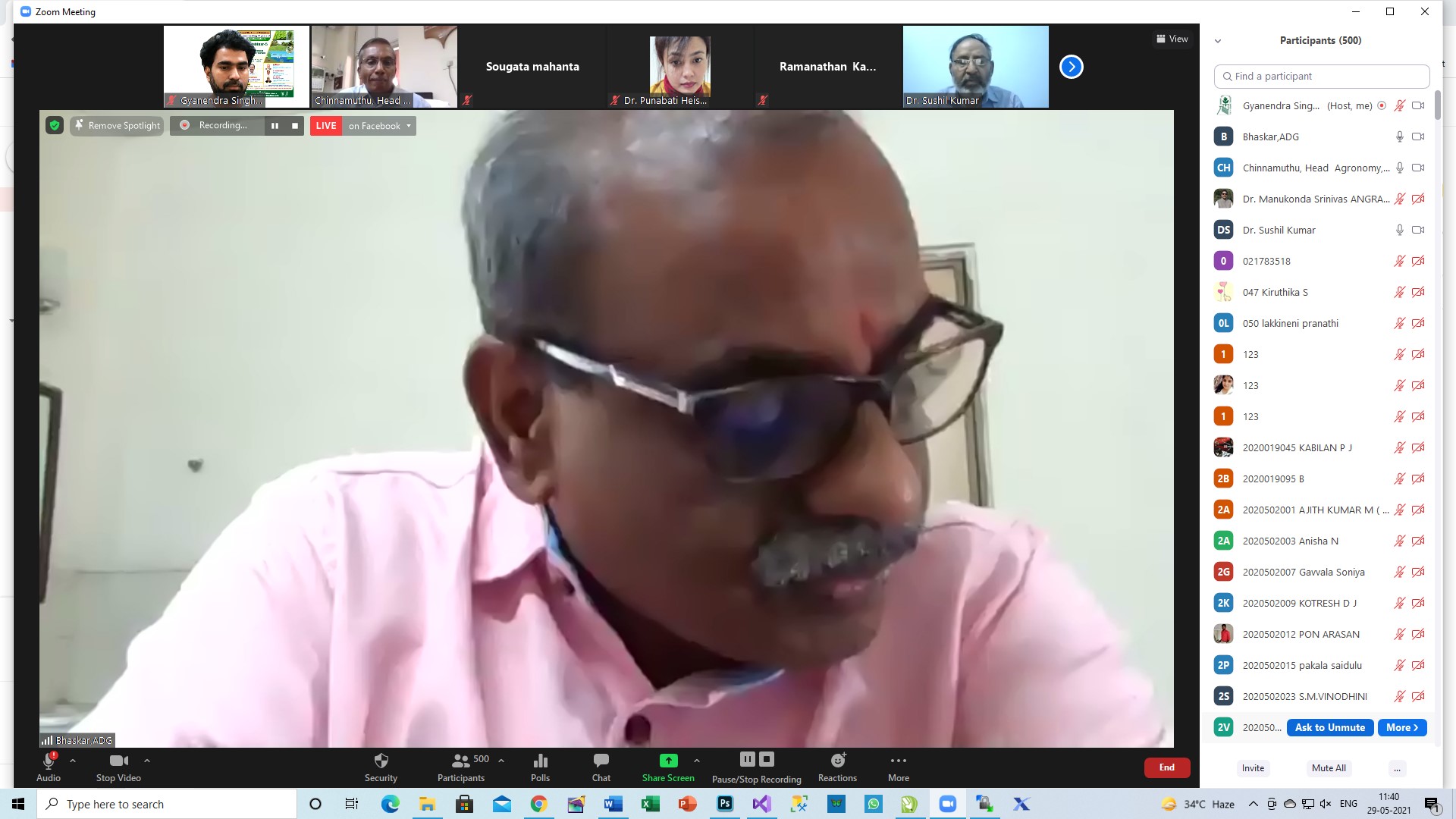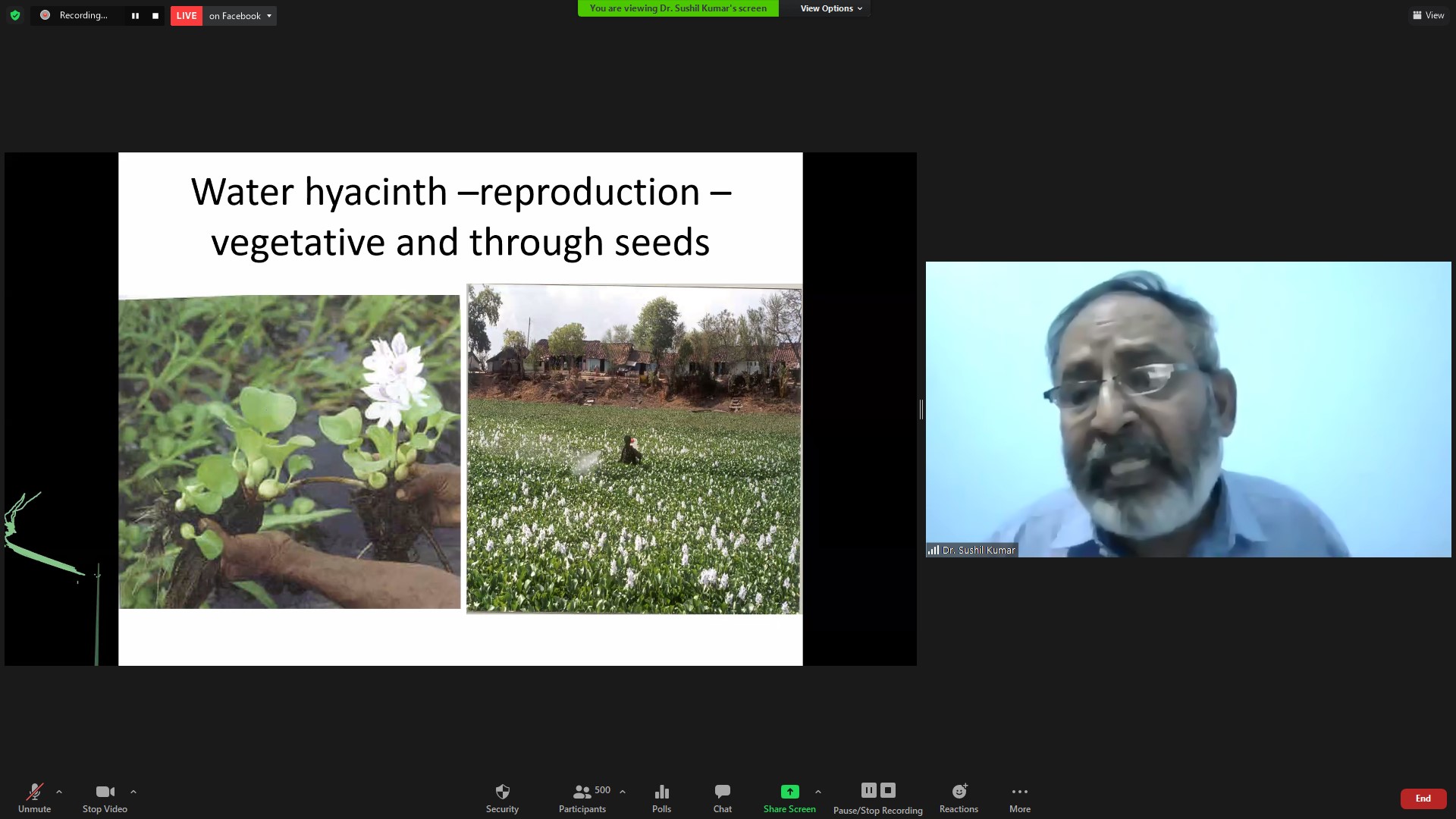



Topic: Aquatic weeds: Problems and their management for improving water productivity
Lead Speaker: Dr. Sushil Kumar, President, Indian Society of Weed Science (ISWS), and Principal Scientist, ICAR-Directorate of Weed Research (DWR), Jabalpur
Organizers: ISWS & ICAR-DWR, Jabalpur
Date: 29-05-2021 (11.30 AM)
Chairman: Dr. S. Bhaskar, ADG (Agronomy, Agro-forestry & Climate Change), ICAR, New Delhi
Convener: Dr. CR Chinnamuthu, Vice-President, ISWS, and Professor & Head, Deptt. of Agronomy, TNAU, Coimbatore
Organizing Secretary: Dr. JS Mishra, Secretary, ISWS & Director, ICAR-DWR, Jabalpur
Brief Report
Water is one of most important natural resource and in fact basis of all life forms on this planet. Therefore, appropriate management of water from source to its utilization is necessary to sustain the normal function of life. India is a home to 18% of the global population but has only 4% of the global water resources. Its per capita water availability is around 1,100 cubic meter (m3), well below the internationally recognized threshold of water stress of 1,700 m3 per person, and dangerously close to the threshold for water scarcity of 1,000 m3 per person. India has 1.9 m ha under water in reservoirs and 1.2 m ha under irrigation canals. The area under village ponds and tanks is nearly 2.2 m ha. About 1.0 million ha of inland water-area in this country is threatened by the invasion of noxious aquatic weeds. Aquatic weeds are posing serious threats to water availability, fishing and navigation, other aquatic flora and fauna, aesthetic value of water bodies, productivity of irrigation and hydroelectric projects, ecosystem services, human health, etc. Out of about 160 aquatic weeds, Eichhornia crassipes, Ipomoea aquatica, Typha angustata, Ceratophyllum demersum, Salvinia molesta, Nelumbo nucifera, Alternanthera philoxeroides, Hydrilla verticillata, Vallisneria spiralis, Chara spp., Nitelia spp., Potamogeton spp. are of primary concern in India.
To commensurate with the Govt. of India’s mission “Bharat ka Amrut Mahotsav” commemorating 75 years of India’s Independence, it was thought appropriate to organize this Webinar under the NRM theme “Improving water productivity”. The lead speaker Dr. Sushil Kumar, President, Indian Society of Weed Science (ISWS), and Principal Scientist, ICAR-Directorate of Weed Research (DWR), Jabalpur, very comprehensively delivered the talk covering different aspects that included types of aquatic weeds viz., floating, submersed, and semi aquatic, etc., their biology, losses, management strategies (physical, mechanical, chemical and biological), and various ways of utilization, especially for water hyacinth. Because of the multiple use of water and herbicide residue problems, label claims for herbicide use have not been given (except for 2, 4-D) for management of aquatic weeds. He presented in detail that how the integrated approach using Neochetina beetle and mechanical removal has helped in managing water hyacinth in Moti lake of Motihari district of Bihar and a big pond in Haliyal village of Dharwad district of Karnataka. The removed biomass of water hyacinth is a rich source of nutrients, and can be easily converted in to rich organic manure through vermicomposting.
Dr. S. Bhasker, the Chairman of the Webinar highlighted the issue of aquatic weeds in lakes and aquatic crops like Makhana, water chestnut and others in wetland ecology of eastern India, and its effect on fishing and navigation. He also stressed upon estimation of evapotranspiration losses caused by different aquatic weeds, estimation of carbon sink, ecosystem services, biodiversity contribution, ecosystem services, etc of different aquatic weeds. There may be a trade-off between water loss and biodiversity gain, he added. Mapping of lakes and water bodies infested with different aquatic weeds need to be carried out.
More than 500 participant including scientists, students, representatives from herbicide industry and other stakeholders, attended this webinar through virtual mode including Zoom link and Facebook. After the deliberation, there was a very fruitful discussion. Dr. CT Abraham from Kerala raised the issue of using herbicides for aquatic weed management because water has multiple uses. As these weeds are used for phytoremediation of polluted water, local municipal authority should see that the heavy metal containing water should not be allowed to flow in ponds/lakes, if we remove the aquatic weeds from the ponds. Dr. AS Rao from Andhra Pradesh raised the issue of management of aquatic weed in aquaculture, which was suitable replied by the speaker. Dr. TK Das from, IARI, New Delhi wanted to know the conversion ratio of water hyacinth for vermicomposting. Dr. RM Kathiresan clarified that the conversion ratio of water hyacinth to vermicompost is 35:1. He emphasized more on inundative approach using bio-herbicides for management of aquatic weeds. Dr. TV Ramchandra Prasad from Bengaluru suggested to include grass carp also as a biocontrol agent for aquatic weed management. Dr. JC Majumdar from Herbicide Industry wanted to know if there is any National programme on management of aquatic weed in India, which was clarified as there are state sponsored management programmes, but not at the national level. Dr. IC Barua from Assam pointed out that Salvinia is not a problem in north-east, rather Ludwigia peruviana and Alternenthera philoxuroided are upcoming threats to rice cultivation in many north-eastern rice growing areas. In addition to water hyacinth, there is a need to focus other aquatic weeds also, he added. Dr. Chinnamuthu, from TamilNadu wanted to know if there are some growth retardants to check the growth of aquatic weeds. It was also suggested that Drone Technology can be evaluated for spraying herbicides in lakes and bigger ponds infested with aquatic weeds. Dr. JS Mishra, Director DWR and organizing Secretary suggested that a comprehensive study need to be initiated for management of aquatic weeds including water quality, effect on aquatic flora and fauna, ecosystem services, water quality, trade-off, etc. There is a need to monitor weed shift in aquatic system and effect of climate change on weed flora and bioagents. Need-based mechanical tools need to be developed to remove aquatic weeds, he added. In his concluding remarks, Dr. S. Bhaskar, Chairman suggested that an integrated approach involving local community is needed to manage the aquatic weeds in water bodies. Use of herbicide in aquatic environment is risky. It will further add to water pollution. Mechanical removal of the weed involving Government schemes like MNREGA and local communities may be the better option. There is a need to initiate the research to prevent weed seed germination using pre-emergence herbicides in dry water bodies. This can be done under AICRP-WM programme, he added. He also pointed out the as the bioagents are season bound, their multiplication throughout the year may a major problem. Generation of data bank on aquatic weeds and mapping is required to sensitize the policy makers.
Dr. CR Chinnamuthu, Vice-President, ISWS and Convenor of the programme, proposed the vote of thanks.
(JS Mishra)
Secretary, ISWS